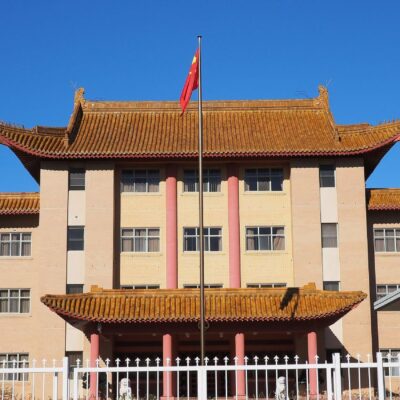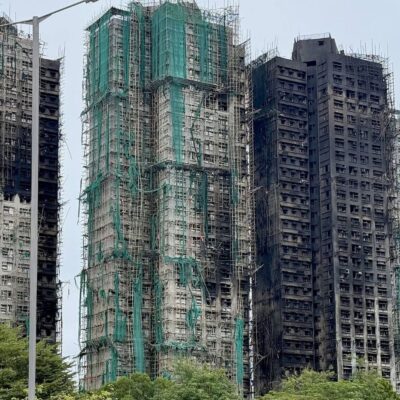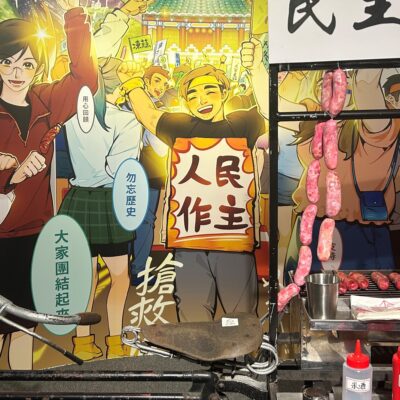The Chinese government’s ruthless crackdown on the Uyghur people has brought international attention to the widespread human rights abuses occurring in the Xinjiang Uyghur Autonomous Region (XUAR) under the Chinese Communist Party (CCP) regime of Party Secretary Xi Jinping. The mass arbitrary detention of Uyghurs and other Muslim minorities in prison-style re-education camps, what the UN High Commissioner for Human Rights concluded may constitute ‘crimes against humanity’, foregrounds the CCP’s obsession with social control and the elimination of both political and cultural dissent.
Less widely acknowledged is the extent to which Xi’s policies in Xinjiang reflect a broader project of social re-engineering—what Xi and Party officials refer to as ‘soul-casting’ (铸魂). In this short article, I seek to first tease apart the logic and history of soul-casting in China and then illustrate the concrete policy instruments behind its implementation in Xinjiang.
By understanding the modus operandi of soul-casting in Xinjiang, we are in a better position to appreciate how the Party is attempting to remould other parts of Chinese society—from Hong Kong to Kashgar and the vast Han heartland in-between—in the pursuit of wealth, power and regime stability. To fully grasp these dynamics, we must take the Party’s political language seriously and attend to what it reveals about both the intentions behind policy decisions and their actual outcomes.
Fear of Small Numbers
In the Uyghur homeland—what the Chinese call Xinjiang (新疆, New Frontier)—the 11.5 million Uyghur people are a triple-stigmatized Other: racialized, religiously marked, and demographically marginal. As such, they linger as liminal subjects at the edge of China’s Han-centric national imaginary. Since their incorporation into the People’s Republic of China in 1949, the CCP has sought to integrate the Uyghurs and other Muslim and Turkic-speaking peoples into the nation-state, at times through co-optation, and at other times through coercion.
The CCP has a long history of what the Indian-American anthropologist Arjun Appadurai calls ‘fear of small numbers’: be they Nationalist spies during the Yan’an Period (1935-47); prostitutes, rightists and other social deviants during the 1950s; counterrevolutionaries during the Cultural Revolution (1966-76); and Falungong and other cult members during the Reform Era (1978-2012). These minorities trigger an anxiety of incompleteness among the Chinese ruling majority—fear that the one billion strong Han majority is merely an inchoate ‘plate of loose sand’ (一盘散沙) in the words of Sun Yat-sen, the so-called father of the Chinese nation (国父).
In Xi Jinping’s self-declared New Era (2012-), the Uyghurs emerged as the chief target of this fear of fragmentation. First, as a strategic periphery, Xinjiang is a zone of anxiety about national security and territorial integrity, intensified by Uyghur transnational ties to the broader Muslim world and the global wave of Islamophobia. Second, Uyghur linguistic, religious and cultural practices highlight the Party’s incomplete nation-building project, with those speaking Uyghur, using Islamic greetings or refusing to smoke in public suspected of harbouring ‘extremism, separatism and terrorism’. The Party believes these ‘three evil forces’ (三股势力) must not only be eradicated but also replaced with new beliefs, practices and symbols—ones capable of physically embodying and materially reifying the Han nation.
Yet the very idea of a ‘Han nation’ (汉民族), which purportedly includes more than 91 percent of the PRC population, is an unstable, invented category: an imagined community that Cantonese speaker Sun Yat-sen and other 20th century Chinese nationalists (including Mao and Deng Xiaoping) felt uncomfortable embodying let alone leading. Ever watchful, the Chinese Communist Party has cast a wary eye over its shoulder at restive minorities, fearing they might tear the Party and its putative Han nation asunder. These insecurities, Appadurai demonstrates, drive majorities into ‘paroxysms of violence’ against vulnerable minorities like the Uyghurs in the pursuit of the fantasy of national purity and wholeness.
Casting the Nation in Xi’s New Era
Chinese leaders turned to the talisman of nationalism (民族主义) to transform the heterogeneity of the former Qing empire (1644-1911) into a single, unified Zhonghua nation/race (中华民族). ‘Backward’ minorities, Sun Yat-sen declared in 1919, were destined to smelt together with the Han majority in the evolutionary heat of the melting pot. Mao Zedong, in contrast, believed the CCP needed to play a more active, interventionist role in shaping the masses (majority and minority alike). Deemed ‘blank sheets of paper’ (一张白纸), they were overwritten time and again through the ritual of ‘ideological remoulding’ (思想改造) in the name of national unity and revolutionary zeal.
In the post-Mao reform era, CCP leaders such as Deng Xiaoping turned to market forces to reshape the human and physical geographies of China. Diversity was treated as a temporary inconvenience: ‘ethnic particularities’ (民族特点) that would gradually erode, perhaps over centuries, under the homogenising pressure of market forces. Xi Jinping is less patient. He is taking China back to the future, echoing Mao on the importance of ideology, correct thought and behaviour, and the need to actively stoke the flames of ‘national fusion’ (民族融合).
Discarding the Party’s earlier commitment to regional ethnic autonomy, Xi now demands Party officials zealously ‘forge’ (铸牢) a consciousness of shared identity with the Zhonghua nation/race among China’s 125 million ethnic minorities. The metaphor of forging or casting—illustrated by the ancient Chinese pictograph鑄 (zhù)—provides a powerful lens through which to understand how the fear of incompleteness is driving Party-state officials in China to take such drastic measures to solidify the souls of its citizens.
Just as the character depicts molten metal being poured into a sand mould, the CCP is melting down the heterogeneity of minority cultures and recasting them in Party-defined norms through forced assimilation and cultural erasure. The task of ‘casting souls and educating people’ (铸魂育人) is most onerous among the Uyghurs as they are believed to be furthest from the Han normative centre and subjected to the corrupting influences of Arab and Islamic cultures.
Xi has repeatedly spoken about the need for a ‘soul engineering project’ (灵魂工程) if the Party is to lead the Chinese people in achieving his so-called China dream. Writers, educators, and most importantly, Party officials are termed ‘engineers of the soul’ (灵魂的工程师), responsible for transforming ‘rudderless souls’ (无魂的躯壳) and ‘cancerous cells’ (癌细胞) into patriotic citizens with the ‘red gene’ (红色基因) and the ‘correct’ (正确) view of the nation (its history, culture, and identity) as well as the Party’s leadership.
Soul-casting in Xinjiang
Since 2014, soul-casting has been a whole-of-society project in Xinjiang and beyond. A spate of terrorist attacks carried out by a small number of radicalised Uyghur militants—most notably the brutal 1 March 2014 knife attack at Kunming train station—shocked the nation. State media and other commentators likened the incident to China’s ‘9-11 moment’. In response, Xi described Uyghur terrorists as ‘rats’ to be crushed under the full weight of society. Rather than adopting a targeted counter-terrorism strategy, the state pathologised the entire Uyghur population, portraying them as afflicted with a kind of ideological illness or hallucinogenic delusion. Uyghurs and other Muslim minorities were cast as mentally unwell and in urgent need of ideological ‘treatment’, a remedy that, according to official discourse, must ‘penetrate like an intravenous needle’. This therapeutic metaphor became the Party’s rationale for a sweeping set of policy interventions, building on earlier CCP efforts to embed the Party even more deeply in the everyday lives of ordinary Uyghurs.
Possibly over a million Uyghurs were detained extra-judicially in large-scale camps, where they were subjected to what officials termed ‘concentrated transformation through education’ (集中教育转化). Detainees underwent compulsory instruction in Mandarin, Chinese law, history and culture—presented as a form of remedial education. In practice, these facilities bore striking resemblance to historical concentration camps: widespread reports of the malnutrition, torture, sexual abuse, death in custody have since emerged and are now well documented.
While re-education camps primarily targeted adults who missed the patriotic education of the post-1989 era, state schooling—beginning now at age four—has placed soul-casting at its core. Under Xi, the Party has rewritten and standardised textbooks and curricula, mandated Putonghua-medium instruction, and placed Han-centric Party norms, history, and symbols at the core of the education system. Uyghur and other minority students are often placed in state-run boarding schools, where separation from their familial and cultural environments makes them more susceptible to ideological shaping.
Across Xinjiang, the Party-state has created a panopticon of mass surveillance. The aim is to identify and then correct ‘deviant’ thought and behaviour through self-censorship and more targeted re-education work. This includes the use of facial recognition cameras, social media and phone monitoring, the collection of DNA and other biological samples, and vehicle and movement tracking applications. The goal is not just to monitor life, but to reshape it.
Most monitoring in Xinjiang isn’t automated. Rather it remains in the hands of Han Party members and their Uyghur foot-soldiers. The Party has constructed a sprawling architecture of repression, which mobilises thousands of grassroot officials, informants, and police to surveil communities, report infractions, and carry out ‘corrective’ interventions. And when persuasion fails, the Party turns to incarceration—through the construction of a network of prisons and detention facilities, including a 220-arce compound that may be the largest prison in the world.
Through the Fanghuiju programme—an acronym for ‘visit the people, benefit the people, and unite the hearts of the people’ (访民情、惠民生、聚民心)—and the ‘Becoming Family’ (民族团结一家亲) campaign, the Party extends soul-casting deep into the domestic sphere. Launched in 2014, the Fanghuiju programme deploys thousands of Han work teams to remote villages, primarily in southern Xinjiang, under the guise of poverty alleviation, state care, and counter-extremism. These teams serve dual roles: conducting surveillance and delivering ideological indoctrination, including the transformation of both public and domestic spaces. Building on this, the Becoming Family initiative pairs over a million Party officials with Uyghur and other minority households from 2016 onward. These Han ‘relatives’ are required to live, eat, and even sleep alongside their assigned families—at one point, for at least five days every two months—an intimate intrusion masquerading as ethnic harmony.
Functionally, Fanghuiju and Becoming Family, both still active, serve as grassroots instruments of ‘authoritarian reflectiveness.’ They foster a fatalistic acceptance of state-led transformation and compel most Uyghur residents to comply with official demands. Those who resist face public shaming, social exclusion, and ultimately, state violence. As top-down development and social initiatives, these programs do bring some benefits to local communities, but they also operate as deeply invasive tools of settler-colonial control, targeting the most intimate spheres as a frontline in the effort to ‘cast souls’ and cultivate loyal subjects of the Chinese nation-state.
Labour has emerged as another key site of re-education. Through coercive labour assignments, the CCP mobilises ‘surplus’ Uyghur labour by detaching them from familial, linguistic and religious community and then assigning them to factories in Han-dominated cities like Ürümqi, Shanghai and Guangzhou. Justified as poverty alleviation and vocational training opportunities, these state-led programs operate as another disciplinary mechanism for reshaping Uyghur subjectivity, reordering moral values, and embedding Han rationality into everyday life. To enforce group discipline and factory efficiency, Uyghur cultural practices—such as Islamic greetings, head coverings, and halal diets—are forbidden and replaced with repetitive, Han-centric rituals. Compliance is measured not only in productivity but also in attitude, language use, and participation in required political study sessions in Mandarin.
The CCP’s systematic destruction of mosques, shrines, cemeteries, and Islamic architectural features across Xinjiang constitutes not only a campaign of physical erasure, but also a calculated assault on Uyghur religious and cultural subjectivity. As documented by the Xinjiang Data Project, over 65 percent of mosques have been altered or demolished since 2017, while sacred pilgrimage routes and cemeteries have been bulldozed or ‘standardised’ into secular public spaces and Han tourist sites. Ordam Mazar—once a revered pilgrimage site—was razed in 2017 and now lies buried beneath the desert sands, its memory erased as if it had never existed.
This architectural purge is central to the Party’s soul-casting agenda: it breaks intergenerational memory and sacred geographies, reorienting spiritual life toward the Party and inserts a sanitised, Han-centric narrative into the everyday landscape. Religious life, once central to Uyghur identity, is thus redefined by the state, making space only for Han socialist piety—loyalty to the Party as the new moral horizon. At the same time, it is using the southern expansion of the Han-dominated Xinjiang Production and Construction Corps (or Bingtuan 兵团 for short) as a strategy for diluting and swamping the Uyghur majority population in Southern Xinjiang, opening yet another beachhead for Han settler colonialism.
Finally, the Party’s use of coercive Uyghur birth control also functions as a biopolitical tool of transformation. The sharp decline in Uyghur birth rates—up to 66 percent in some counties—has been achieved through forced IUD insertions, sterilisations, punitive fines, and even internment for ‘illegal births’. This policy is not merely one of demographic control, but a form of biological reengineering aimed at reshaping the Uyghur body politic. CCP cadres frame these policies as necessary to improve ‘bio-quality’ (素质) and eliminate ‘backward and outdated’ reproductive customs, marking Uyghur fertility itself as a site of ideological deviance. In doing so, the state seeks to domesticate Uyghur womanhood and family life under the guise of modernisation, forcibly aligning them with Han reproductive norms and Party-defined visions of civility and obedience.
Conclusion
In today’s China, soul-casting is the Chinese Communist Party’s answer to its deep anxiety of incompleteness—an enduring fear that beneath the veneer of Party and national unity lies a fractured, unsteady Han core and body politic. The Uyghurs, as a stigmatised and once defiant minority, have become the ultimate test case for the Party’s fantasy of total cohesion. What Appadurai calls the ‘fear of small numbers’ finds its most advanced and chilling expression in the camps, classrooms, homes, factories, and wombs of Xinjiang.
The idea of ‘casting the individual’ (铸人) dates back to the time of Confucius (circa 551–479 BCE) and the Confucian ideal of self-cultivation. Chinese thought contains a long-standing current—from Confucianists such as Xunzi to the Legalists and now the modern Leninist state—where moral cultivation is transformed from an internal, voluntary process to a top-down, state-managed project. As the foundry for souls, the CCP believes it must first plane away what Chinese philosophers called ‘crooked timber’ (曲木)—stripping away ‘deviant’, ‘corrupting’ thought and behaviour—before teaching proper deportment, thinking and loyalty.
Or put in Party-speak today, soul-casting is about ensuring Xi Jinping Thought is ‘the fixed point for thinking and the compass for behaviour’ among the Chinese people, as a recent People’s Daily editorial asserts.
Soul-casting, of course, isn’t unique to Xinjiang nor China for that matter. It is a type of Foucauldian biopolitics—the attempt by modern states to govern not just bodies but the conduct, beliefs and inner life of their populations. And it is common to many majoritarian or settler colonial regimes, be it citizenship laws that seek to define Indianness in non-Muslim terms in Modi’s India or the framing of Israel as a small Jewish nation surrounded by hostile Muslim neighbours and distrusted yet internal Palestinian, Mizrahi and other minority communities.
In Xinjiang, we glimpse the logical endpoint of a politics that cannot tolerate difference—not just in bodies, but in souls.
Image: A man and child with a horse on a mountain in Xinjiang. Photo by Yu Gui on Unsplash.




